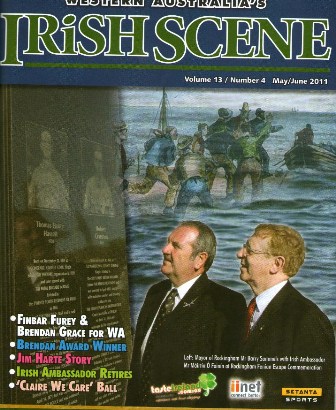‘Celebrating 200 years of the Wild West’
An article on Clifden 2012 in Western Australia’s Irish Scene Magazine May/June 2011
Almost two hundred years ago Galway native John D’Arcy moved his wife and three children to a remote and isolated landscape that would later inspire writers, poets and painters.
“It was like a wild west town in America,” said local historian and author Kathleen Villiers-Tuthill.
Yielding local resources such as granite, wool and fish, this wild west is not within a cowboy’s holler of America’s wild west. This is the wild west of Ireland.
The area appealed to the twenty six year old D’Arcy who owned over 17,000 acres on the west coast of Connemara. The D’Arcy family was one of the famed 14 tribes of Galway. Their connections and affinity with the west of Ireland were strong and ancient.
John D’Arcy moved to his frontier settlement in 1812 and called the town An Clochan, meaning rocks or stones. In English he invented a new word for his frontier town, Clifden, no one knows why.
“It was a very remote, isolated area and there were very poor quality roads and in some cases no roads at all connecting it with the nearest towns which would have been Westport and Galway,” said Villiers-Tuthill.
D’Arcy virtually imported trades people into the area because, “he saw the advantages it would bring to the area and to his own estate” said Villiers-Tuthill.
“(The people) came here because the advantages were here and the possibility of making a better life for themselves was here,” she said.
D’Arcy saw potential in the area and wanted to develop a fish station in Clifden, but according to Villiers-Tuthill the initial success was met with failure.
“Clifden was too far inland,” said Villiers-Tuthill. The fishing station was not successful.
“(Clifden) became a market town rather than a fishing station.” Clifden provided a market for the locals to sell their agricultural produce such as oats, potatoes, vegetables and fish.
“They were able to bring their goods into the market and sell them there. So it created a center,” Villiers-Tuthill said.
Rocky terrain aside, there are pockets of fertile land. Locals used seaweed to fertilize the land. “They still use it today,” Villiers-Tuthill said. If people live close to the shore and if they can bring seaweed in easily they will still use it according to Villiers-Tuthill.
Apart from fertilizing land, other uses for the local seaweed include, medicinal and cosmetic purposes. Seaweed baths in spas throughout the country are popular. According to Villiers-Tuthill a seaweed bath is “gorgeous!”
Numerous artists, authors and poets are drawn to Clifden specifically. Artists are attracted to Clifden by the light according to Villiers-Tuthill.
“I am told that the light is absolutely perfect for them and that they love it because of that,” she said.
J.R.R. Tolkien, author of The Hobbit and The Lord of the Rings Trilogy, allegedly used the landscape of Connemara as inspiration for his fantasy landscapes.
“Writers came because of the solitude, and the fact that you experience a completely different world than even on the east coast of Ireland,” Villiers-Tuthill said.
“You have the feeling as you are driving through the rugged landscape of Connemara that you are breaking into another era, almost like another country,” she added.
Villiers-Tuthill is part of an eight member committee which has planned the upcoming bicentennial celebration of Clifden since 2009.
“We want to try to mark the occasion, interpret our history in as many ways as possible so as to make it acceptable to small children and to people who don’t have the slightest bit of interest in history,” to “those who are genuinely, deeply interested in history,” she said.
At present the plans involve the third annual Genealogical and Local History seminar on April 16. Speakers include Rob Goodbody, Paul Gosling, Siobhan Mc Guinness, Gregory O’Connor and Kathleen Villiers-Tuthill herself.
“The big one next year is the one we’re hoping people will come from abroad,”
Villiers-Tuthill said.
The planning of the big bicentennial celebrations is cheering up the locals amidst the recession and austerity measures according to Villiers-Tuthill. “It is raising the morale,” she said.
Locals are planning to bring the Irish Diaspora of Clifden and Connemara back for a 2012 celebration that promises Irish Music, traditional boat Regatta, and a number of seminars throughout the year. The main week of celebrations will be May 25 to June 4, 2012.
“We’re celebrating (the bicentennial) for ourselves and hoping that by putting on a genuine festival where the local people are involved and the local people are enjoying themselves that any tourists who come will actually be part of a local festival,” she said.
“We would love to have people come back and join in it, they’ll definitely find us in our best of form,” Villiers-Tuthill said.
For more information on the celebrations and the history of Clifden and the D’Arcy family visit www.clifden2012.org
Written by Loretto Horrigan Leary

